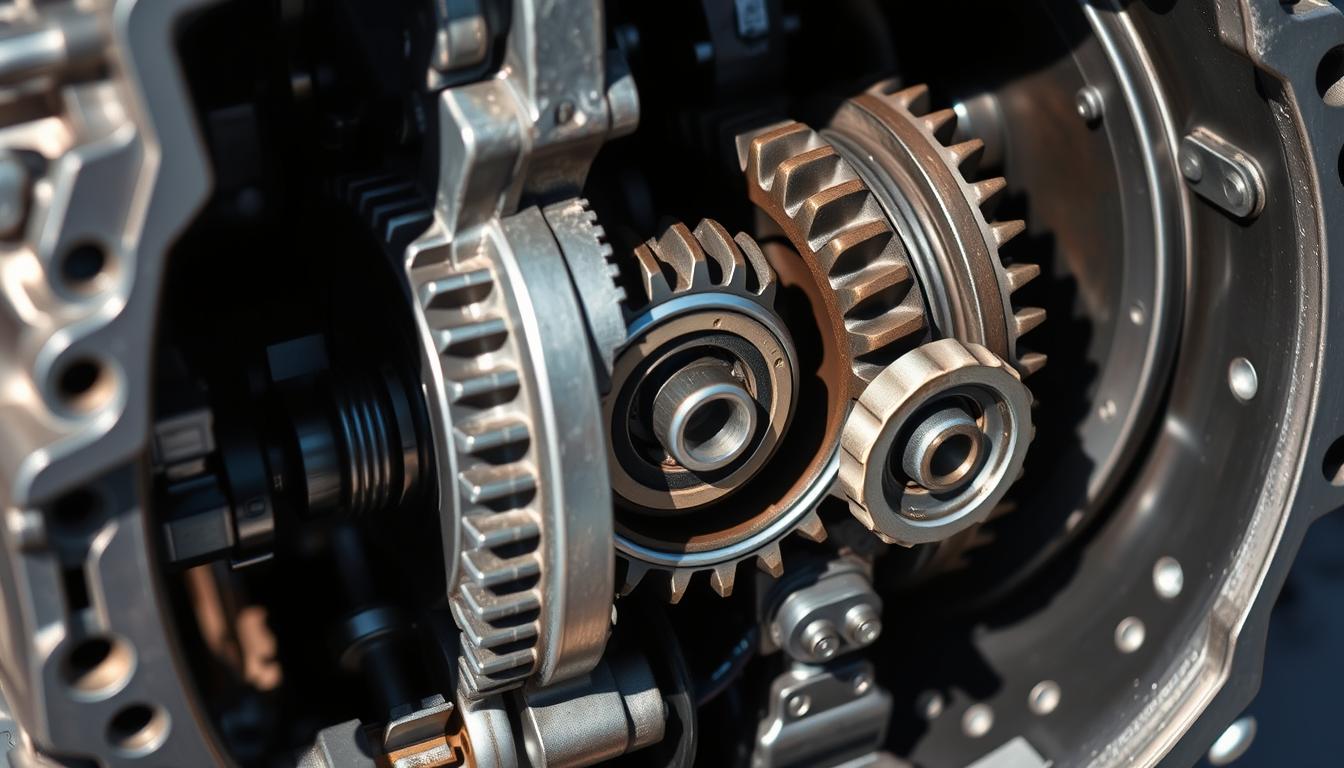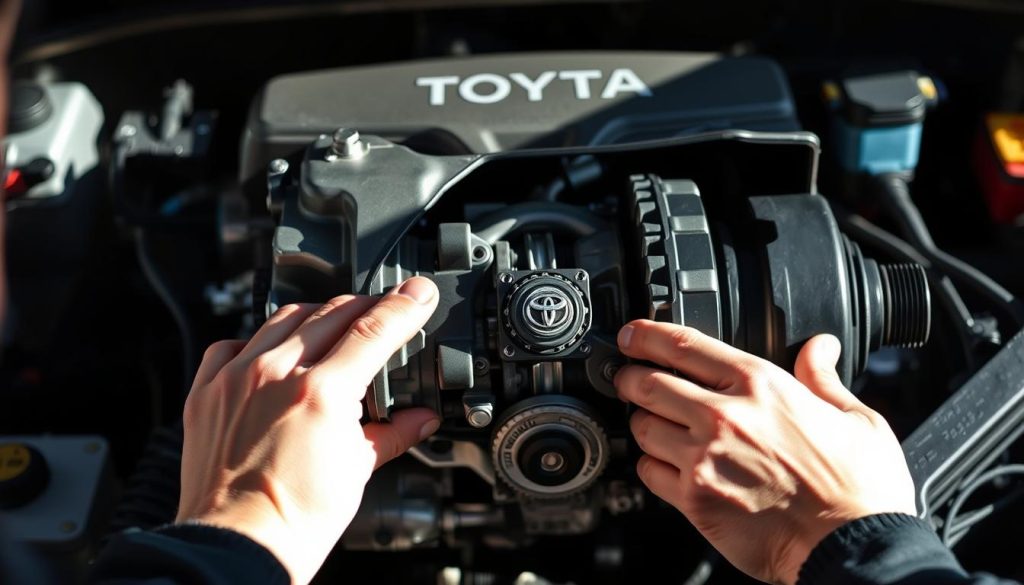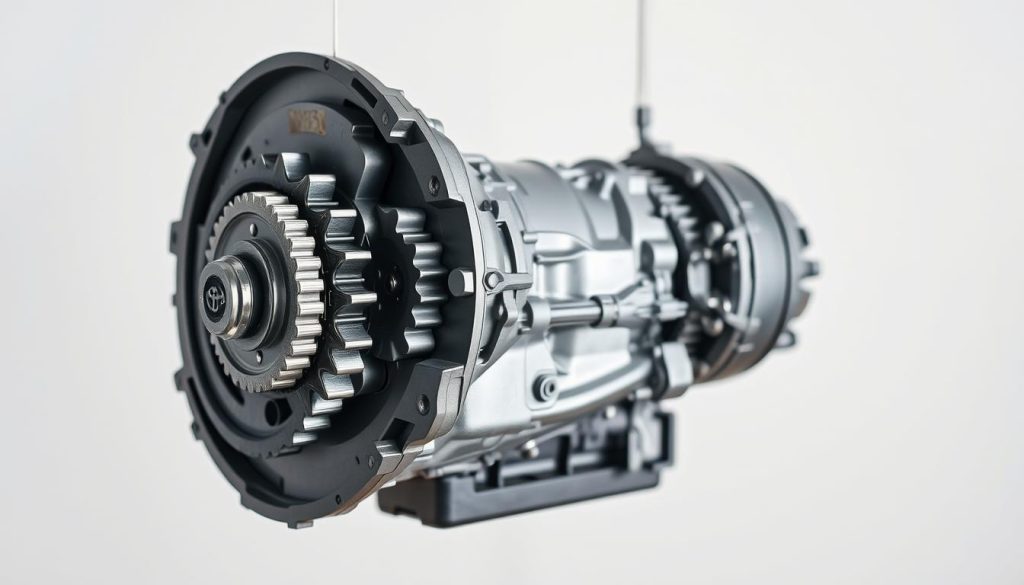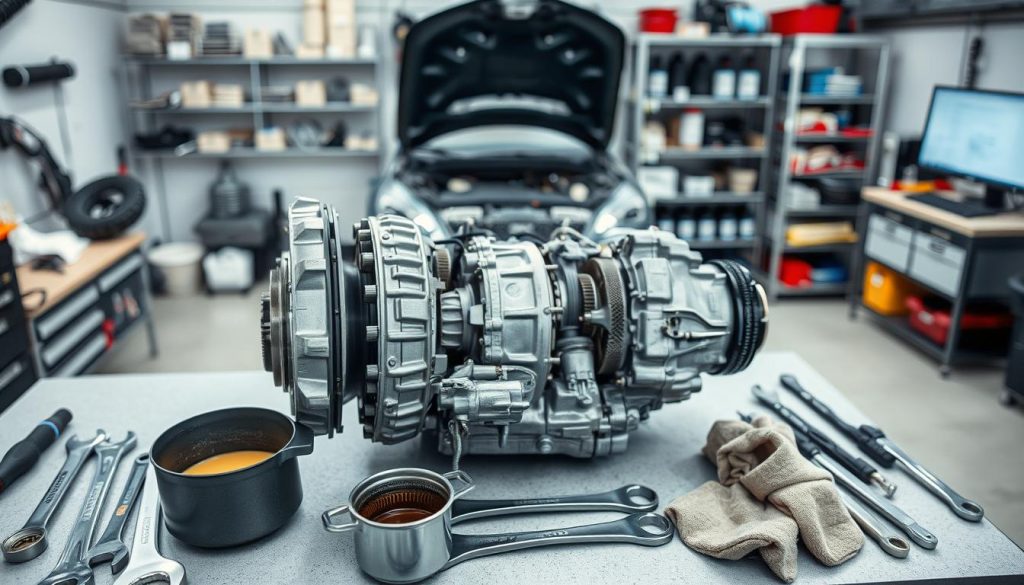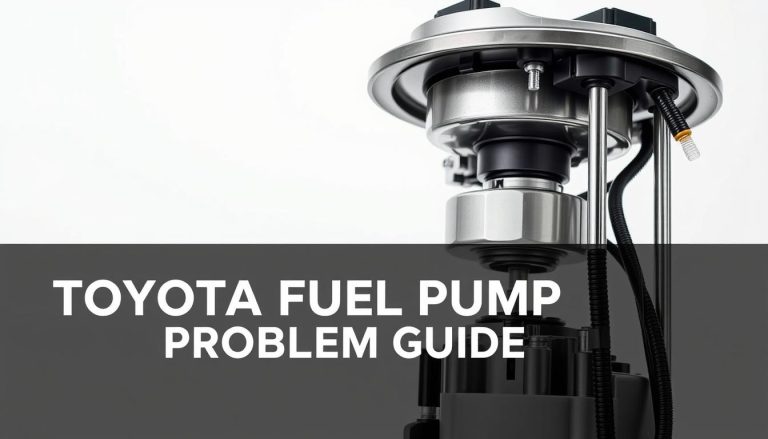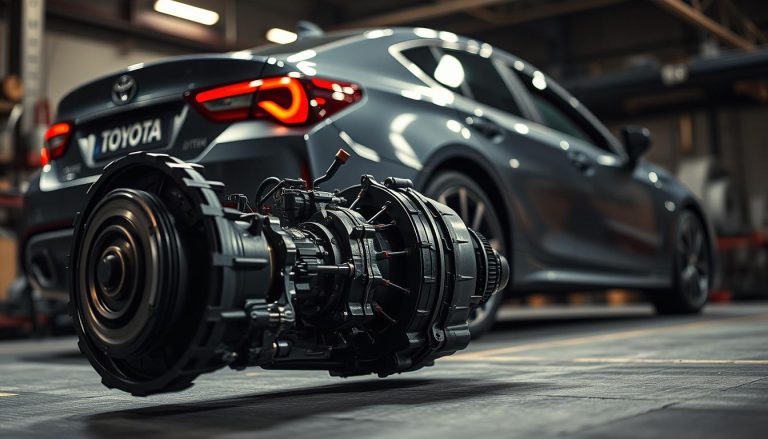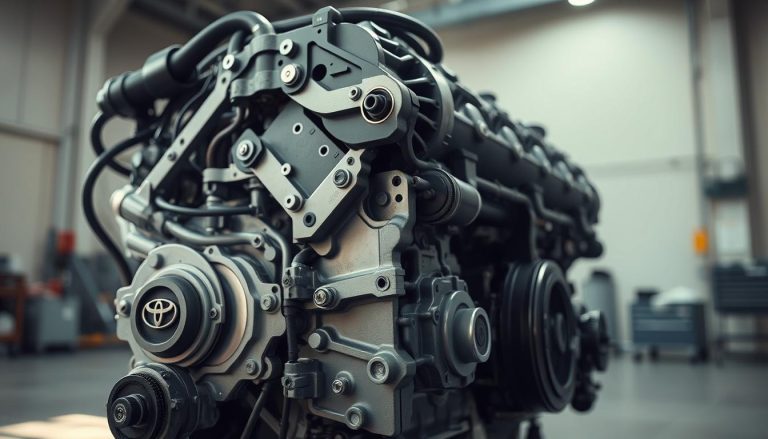Troubleshooting Toyota Transmission Noise Issues
Fixing Toyota transmission noise problems is key to keeping your car running well. Strange noises from the transmission can mean serious issues are brewing. By knowing the signs, causes, and how to diagnose Toyota transmission noise, you can keep your car in top shape.
This guide will cover all you need to know about Toyota transmission noise repair. We’ll look at symptoms, causes, and how to fix them. Whether it’s whining, clunking, or grinding, we’ll show you how to tackle these problems. This can save you time, money, and a lot of stress.
Keep reading for useful tips and expert advice just for Toyota owners.
Identifying Common Transmission Noise Symptoms in Toyota Vehicles
Toyota owners might hear different noises from their transmissions. It’s important to catch these sounds early. This way, you can get your car fixed before it gets worse. Here are some common noises to watch out for:
Whining and Humming Sounds
Many Toyota owners hear whining and humming. These sounds can mean low transmission fluid or worn-out bearings. It’s a sign that something might be wrong.
Clunking Noises
Clunking sounds when shifting gears are common. They usually mean problems with the drive shaft or internal damage. Getting your car checked right away can help fix these issues.
Rattling and Grinding Sounds
Rattling and grinding sounds are more serious. They often mean worn gears or faulty synchronizers. Regular checks are key to catching these problems early.
Causes of Transmission Noise in Toyotas
Transmission noise in Toyotas can come from several sources. These include problems with fluid levels, wear on components, and mechanical failures. Knowing what causes these noises is key to fixing them.
One common reason is not enough transmission fluid. Fluid levels need to be right for the transmission to work well. If the fluid is low or dirty, it can cause friction and noise. Keeping the fluid at the right level can help avoid this.
Worn-out transmission parts are another big cause of noise. Gears, bearings, and clutches can wear down over time. This wear can make sounds like whining or grinding. Regular checks can catch these problems early.
Also, mechanical issues in the transmission can cause noise. This includes problems like misaligned gears or failing synchronizers. To find the source of the noise, a detailed inspection is needed.
By understanding these causes, Toyota owners can keep their transmissions running smoothly. Regular maintenance and quick repairs are important. They help keep the transmission working well and prevent expensive problems.
Diagnosing Transmission Noise: Step-by-Step Guide
Figuring out why your Toyota’s transmission is noisy can be easy if you follow a few steps. By systematically checking things, you can find out what’s causing the noise. Here’s a guide to help you do just that.
Checking Transmission Fluid Levels
First, check the transmission fluid levels. If they’re low, it might mean there’s a leak. Leaks can cause strange noises. Make sure the car is on a flat surface and the engine is warm before you check the fluid. Look for any signs of old or burnt fluid.
- Ensure the engine is warm
- Check the fluid dipstick
- Look for discoloration or burnt smell
- Top up if necessary, but always use the recommended fluid type
Inspecting Transmission Components
Next, take a close look at the transmission parts. Check belts, bearings, and gears for any wear or damage. If you see any, it could help you figure out the problem.
- Examine belts for wear or fraying
- Check bearings for smooth operation
- Inspect gears for any signs of damage
Using Diagnostic Tools for Accurate Assessment
For a deeper look, use diagnostic tools. A transmission scanner can give you detailed info about the transmission’s health. This is really helpful for finding problems that aren’t easy to see by eye.
With these tools, you can get exact readings and codes. This helps a lot with fixing Toyota transmission noise repair.
| Step | Action | Tools Needed |
|---|---|---|
| 1 | Check Transmission Fluid Levels | Dipstick, Transmission Fluid |
| 2 | Inspect Transmission Components | Visual Inspection, Basic Tools |
| 3 | Use Diagnostic Tools | Transmission Scanner |
How to Address Whining and Humming Noises
Whining and humming noises in your Toyota can be scary. These sounds usually mean there’s a problem with the transmission that needs fixing fast. Knowing what might be causing these sounds and how to fix them can help keep your Toyota running well.
Potential Causes
Several things can make your Toyota’s transmission make whining and humming sounds:
- Low transmission fluid levels, which can cause it to not lubricate properly.
- Worn or damaged belts in the transmission system.
- Problems with the torque converter, leading to uneven power.
- Wear and tear on internal parts like gears or bearings.
Solutions and Repairs
To fix transmission noise, you need to take a few steps:
- Check Fluid Levels: Make sure the transmission fluid is at the right level. Add or change it if needed.
- Inspect Belts: Look for any wear or damage. Replace any belts that are not working right.
- Examine the Torque Converter: If the torque converter is not working right, you might need to replace or fix it.
- Transmission Overhaul: If the problem is really bad, you might need to replace the whole transmission.
By following these steps, you can fix the whining and humming noises. This will make your Toyota’s transmission work smoothly again.
Fixing Clunking and Grinding Transmission Sounds
Clunking and grinding sounds in your Toyota need a detailed check to find the problem. It’s key to know what’s wrong to fix it right. These sounds usually come from worn-out gears or damaged bearings.
Here are some ways to fix these sounds:
- Replacing worn-out gears: Old gears need to be swapped out to stop the noise.
- Aligning transmission parts: Making sure parts fit right helps cut down on friction and noise.
- Lubricating components: Keeping each part well-oiled reduces friction and noise.
- Inspecting and replacing bearings: Bad or worn-out bearings cause grinding sounds and need fixing fast.
Regular checks and quick action are key to fixing Toyota transmission problems. By doing these steps, you can make your car quieter and smoother to drive.
Transmission Fluid Issues: Leaks and Maintenance
Transmission fluid leaks are a common problem in Toyota vehicles. They can cause noise if not fixed quickly. Keeping up with maintenance and fixing leaks fast can prevent damage and keep your car running smoothly.
Common Causes of Leaks
Knowing what causes transmission fluid leaks is key to preventing noise. Some common reasons include:
- Faulty seals
- Damaged fluid lines
- Over-worn gaskets
- Cracked transmission housing
How to Fix and Prevent Leaks
To fix transmission fluid leaks, you need to replace faulty parts quickly. Here’s how to do it:
- Find where the leak is coming from by doing a detailed check.
- Swap out any damaged seals, gaskets, or fluid lines.
- Make sure everything fits right and is securely in place.
- Choose high-quality parts to avoid problems later.
- Check the transmission fluid regularly during maintenance.
Preventing leaks is all about regular maintenance. Here’s what you should do:
- Have your transmission checked regularly for signs of wear.
- Watch for fluid leaks in your driveway.
- Stick to Toyota’s maintenance schedule for fluid changes and checks.
- Only use the transmission fluids and parts Toyota recommends.
The Role of Transmission Components in Noise Production
Understanding how Toyota transmission parts work is key to fixing noise issues. Parts like the torque converter, transmission gears, and clutch assembly are vital for smooth running. But, when they wear out, they can make noise.
The torque converter is important for moving power from the engine to the transmission. Problems here can cause loud whining or humming. On the other hand, damaged transmission gears can make grinding sounds, showing they need fixing.
The clutch assembly helps the transmission engage and disengage. If it’s not working right, it can make noise. Spotting these noises early can stop bigger problems and expensive fixes. Keeping up with maintenance and acting fast helps control transmission noise.
The Impact of Driving Habits on Toyota Transmission Noise
Good driving habits are key to keeping your car’s transmission in top shape. Actions like speeding up too fast, braking hard, and shifting gears roughly can make noise problems worse in Toyotas. Driving more smoothly helps reduce wear and tear on the transmission.
Regular checks are also vital. Routine maintenance, like changing fluids and inspections, is important for Toyota transmission care. These steps help your transmission last longer and make your car quieter.
Teaching drivers how to handle their cars right can solve many noise issues. Making small changes in how you drive and keeping up with maintenance helps keep your Toyota’s transmission working well.
When to Seek Professional Help for Transmission Noise
Knowing when to get professional Toyota transmission repair is vital for your car’s health. If noises keep coming back, it might mean a bigger problem that needs a pro’s touch.
Signs It’s Time for a Mechanic
Spotting the right time to see a mechanic can stop bigger issues later. Here are some signs to watch for:
- Continuous unusual noises: Hearing whining, clunking, or grinding sounds that won’t stop? It’s time for a pro to fix your Toyota’s transmission.
- Fluid leaks: Seeing fluid leaks means serious damage inside that needs a mechanic’s help.
- Difficulty shifting gears: If shifting gears is hard, it’s a big problem. A certified mechanic should check it out.
Choosing the Right Repair Shop
Finding a top-notch repair shop is key. Here’s how to pick the best one for your Toyota:
- Certifications: Look for shops with certified mechanics for Toyotas. This means they’re trained for your car’s needs.
- Reputation and reviews: Check online reviews and ask Toyota owners for tips. A shop with good feedback is likely to do a great job.
- Transparent pricing: Pick a shop that’s clear about costs and gives detailed estimates. This way, you won’t face surprise bills for your Toyota’s repair.
Regular Maintenance Tips to Prevent Transmission Noise
Keeping your Toyota’s transmission running smoothly and quietly is key. Regular care is essential to avoid unexpected noises. Following Toyota’s maintenance tips helps extend your transmission’s life and prevents noise issues.
- Scheduled Fluid Changes: Changing your transmission fluid regularly is a top way to stop transmission noise. Toyota suggests checking and replacing the fluid as your owner’s manual says. Fresh fluid keeps the transmission parts well-lubricated, reducing wear.
- Inspection of Components: Regularly checking key transmission parts like bearings, gears, and seals is important. It helps spot wear early, preventing big problems. Replacing worn parts on time helps prevent noise.
- Adherence to Maintenance Guidelines: It’s vital to follow Toyota’s maintenance advice. These guidelines are made to keep your transmission running well for a long time. Sticking to these guidelines lowers the chance of noise and other issues.
- Professional Assessments: Getting your car checked by certified Toyota mechanics is a good idea. They can find small problems before they get big. This ensures all parts work right and catches any noise-causing issues.
Adding these maintenance steps to your car care routine helps manage Toyota transmission upkeep. It greatly reduces the chance of unwanted transmission noise. Regular maintenance not only makes driving smoother but also protects your investment in your Toyota.
Signs Your Toyota Needs a Transmission Check
Spotting early signs of transmission trouble can prevent expensive fixes later. If your Toyota shows any of these signs, it’s time for a transmission check.
Delayed Acceleration
Delayed acceleration is a clear sign of transmission issues. If your Toyota takes too long to speed up, it might have a slipping transmission. You should act fast to avoid more damage.
Burning Odor
A burning smell in your car means something’s amiss. This smell often comes from overheated transmission fluid. If you smell it, get your Toyota checked right away.
Shaking During Gear Changes
Your Toyota should change gears smoothly. If it jerks, shakes, or grinds, it’s a warning. These signs mean your transmission needs help. Don’t ignore them to avoid bigger problems.
DIY Fixes for Minor Transmission Noise Issues
Minor transmission noise problems in your Toyota can be fixed with simple DIY steps. One common fix is checking and topping up transmission fluid levels. Low fluid can cause noise, and the right amount can quiet it down.
Another easy fix is to inspect and tighten transmission parts you can reach. Loose parts can vibrate and make noise. A basic toolkit might be all you need. Always check your vehicle’s manual for how to adjust parts correctly.
If you hear noise when shifting gears, try inspecting the shift cable. Adjusting the shift cable might stop the grinding sounds. Make sure to follow the manufacturer’s instructions to avoid damage.
For rattling or humming noises, check the transmission mounts. Over time, these mounts can wear out, causing noise. Replacing them might take some effort but can usually be done without a mechanic.
While you can fix minor issues at home, big problems need a pro. Your DIY efforts can save money and keep your car running well.
Toyota Transmission Noise: What You Need to Know
Managing your Toyota’s maintenance means knowing about different transmission noises. You should also understand their causes and how to fix them. This knowledge helps your car run smoothly and saves you money on repairs.
Listening for strange sounds like whining or clunking is key. It helps you spot problems early and take steps to prevent them.
| Type of Noise | Possible Causes |
|---|---|
| Whining | Low transmission fluid, worn-out gears |
| Clunking | Loose or damaged transmission components |
| Grinding | Worn synchronizers, gear damage |
Knowing about Toyota transmission noise lets you fix problems fast. This stops more damage and expensive fixes. Keeping up with regular maintenance is key.
It keeps your transmission running well and makes driving better. Don’t ignore strange noises. They could mean something serious is wrong.
Conclusion
Managing and fixing transmission noise in Toyota cars is key for good performance and a smooth ride. By watching for signs of noise and knowing what causes it, owners can fix problems early. Regular Toyota transmission maintenance makes the transmission last longer and saves money on repairs.
Don’t ignore strange sounds like whining, clunking, or grinding. They mean you should check your car right away. You can try to fix it yourself or get help from a pro. Keeping the transmission fluid right, checking parts, and following service schedules can help a lot.
Looking after your Toyota’s transmission is more than just fixing problems. It’s about a regular care plan to stop issues before they start. With the knowledge and tools from this article, you can keep your Toyota running well. This will make it last longer and perform better on the road.
FAQ
What are common symptoms of transmission noise in Toyota vehicles?
You might hear whining, humming, clunking, rattling, or grinding sounds. These noises often mean low fluid levels, worn parts, or mechanical failures.
How can I diagnose transmission noise in my Toyota?
First, check the fluid levels. Then, look at belts, bearings, and gears. Use a transmission scanner for a detailed check.
What causes whining and humming noises in Toyota transmissions?
Low fluid, belt problems, or worn parts cause these noises. Fixing them might be simple or require part replacement.
How do I address clunking and grinding sounds in my Toyota’s transmission?
Find out if gears or bearings are worn. Replace them if needed. This can fix the noise and improve performance.
What are common causes of transmission fluid leaks in Toyota vehicles?
Leaks can come from bad seals, damaged lines, or worn gaskets. Fixing them means replacing the parts and ensuring they fit right.
How do transmission components like the torque converter and clutch assembly affect noise production?
Worn-out parts like the torque converter and clutch can cause noise. Regular checks and repairs keep your car quiet.
How do driving habits impact transmission noise in Toyotas?
Aggressive driving and skipping maintenance can make noise worse. Teach drivers to drive right and keep up with maintenance.
When should I seek professional help for transmission noise?
Get help if the noise doesn’t go away with regular care. A certified Toyota mechanic can fix it right.
What maintenance tips can help prevent transmission noise in Toyota vehicles?
Regular fluid changes and checking parts can prevent noise. Follow Toyota’s maintenance advice to keep your car quiet.
What are the key signs that my Toyota needs a transmission check?
Look out for slow acceleration, a burning smell, and shaky gear changes. These signs mean your transmission needs attention.
Are there any DIY fixes for minor transmission noise issues in Toyotas?
Yes, for small issues, you can try topping up fluid or making simple adjustments. But, big problems need a pro.

